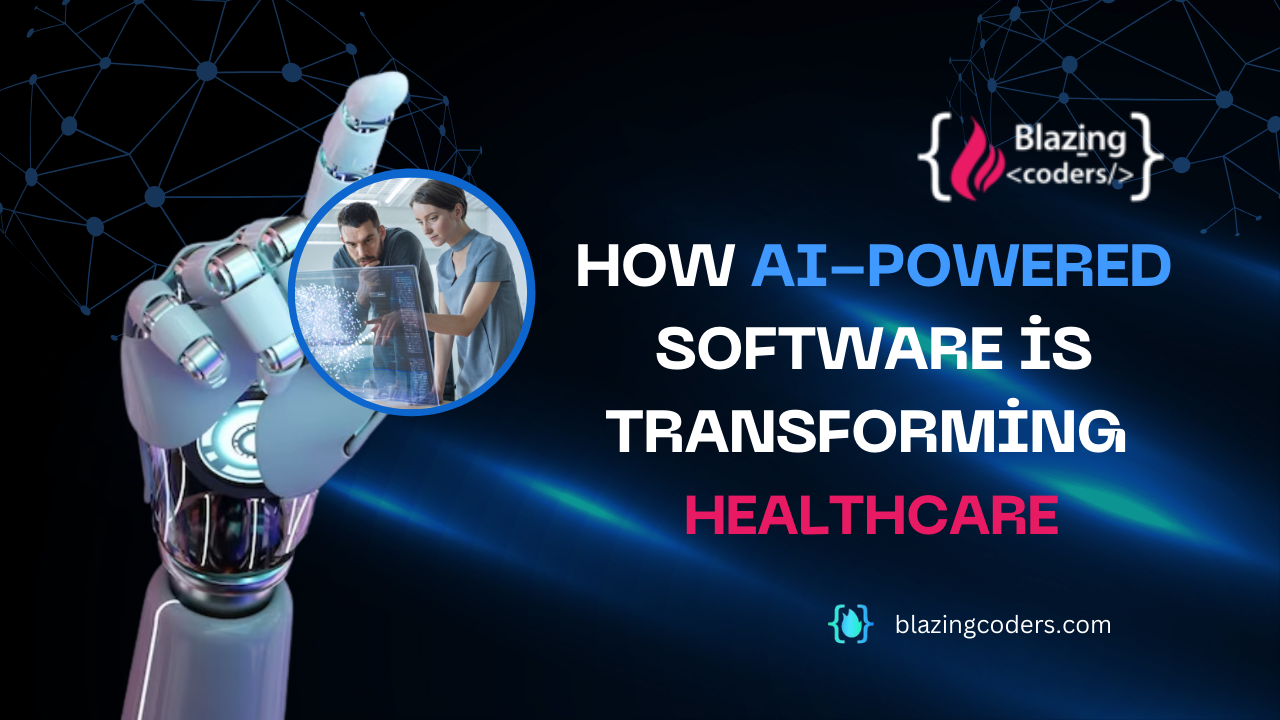How AI-Powered Software is Transforming Healthcare
Thanks to artificial intelligence (AI), the healthcare sector is going through a radical change. AI-powered software is changing the way healthcare is provided, from precise diagnoses to individualized patient care. This change allows for more accurate and proactive responses, which not only increases efficiency but also saves lives.
We'll examine how AI is changing healthcare in this blog, including practical advice, real-world examples, and important data.
The Rise of AI in Healthcare
AI-powered technologies are filling in holes in the healthcare system by tackling issues like patient management, resource allocation, and misdiagnosis. To smoothly incorporate AI into their operations, healthcare organizations are now looking to cutting-edge healthcare app development services.
Quick Stat:
MarketsandMarkets projects that the global AI in healthcare market will expand at a compound yearly growth rate (CAGR) of 44.9%, from $11 billion in 2021 to $64 billion by 2027.
Key Benefits of AI in Healthcare
1. Enhanced Diagnostics and Accuracy
Large volumes of medical data can be analyzed by AI algorithms to identify illnesses earlier and with greater accuracy than with conventional techniques. AI techniques, for example, may detect patterns in imaging scans, such MRIs and X-rays, to find anomalies.
As an illustration, Google's DeepMind created an AI system that can identify more than 50 eye problems with precision on par with human experts.
How It Helps:
2. Personalized Treatment Plans
AI customizes therapy regimens according to a patient's genetic profile, lifestyle, and medical history. Personalized care decreases needless interventions and enhances results.
Real-World Perspective: AI-powered medical applications examine medical records to suggest the best courses of action. These functionalities are being included in digital platforms more frequently by businesses that offer healthcare app development services.
Stat:
AI-powered customized therapy programs can boost recovery rates by as much as 20%, according to McKinsey.
3. Streamlining Administrative Tasks
Administrative inefficiencies cost the healthcare industry billions annually. AI automates repetitive tasks like billing, appointment scheduling, and patient record management, freeing up resources for patient care.
Important Attributes:
Example: An AI-driven system developed by a top healthcare app development company decreased administrative burdens in European clinics by 30%.
4. Drug Discovery and Development
By locating possible molecules, evaluating clinical trial data, and forecasting results, AI speeds up the drug discovery process.
Breakthrough: For instance, Pfizer shortened the time it took to find new drugs for cancer treatments by using IBM Watson to evaluate millions of academic papers and data points.
-
Impact: Cuts the typical medication development period in half, from ten to five years.
-
Reduces expenses dramatically, increasing access to therapies.
5. Remote Patient Monitoring
Continuous monitoring of patients with chronic illnesses or those recuperating from surgery is made possible by AI-powered healthcare apps. Wearable technology and sensors gather data in real-time, which AI examines to identify possible problems.
As an illustration, Apple's HealthKit uses AI to track heart rhythms and notify consumers of anomalies such as atrial fibrillation.
Benefit: Lowers readmissions to hospitals and improves patient safety.
AI-Powered Software in Action: Transforming Patient Care
Let's examine the concrete ways that AI-driven medical software is enhancing patient care:
A Telemedicine Revolution
AI is making precise virtual consultations possible with the rise in telehealth services. Chatbots using AI prescreen patients and direct them to the appropriate specialist.
Case Study: An AI telemedicine program created by an Indian healthcare app development company links doctors and patients in remote areas, resulting in a 40% increase in access to high-quality healthcare.
Predictive Analytics for Proactive Care
AI evaluates patient data to forecast possible health hazards and suggest safeguards.
Real-World Example: By anticipating patient decline in intensive care units, Health Catalyst's AI platform lowers fatality rates by 20%.
AI in Mental Health Support
Woebot and other AI systems offer therapy-based interactions and round-the-clock help to people who are struggling with depression or anxiety.
Impact:
Challenges and Ethical Considerations
Despite its promise, AI in healthcare faces hurdles:
-
Data Privacy Concerns: The security of patient data must be a top concern.
-
Bias in Algorithms: It is necessary to test AI tools for accuracy and fairness.
-
High Implementation Costs: Initial investments may be difficult for healthcare providers.
Insight:
To overcome these obstacles and ensure cost-effectiveness and compliance, collaborate with a seasoned healthcare app development business.
The Future of AI in Healthcare
AI integration is only the first step. The possibilities for the future are even more sophisticated:
-
AI-Powered Surgical Robots: Accuracy and effectiveness in intricate procedures.
-
Virtual Health Assistants: Completely AI-powered instruments for comprehensive patient care.
-
Genomic Analysis: Genomes will be decoded by AI to provide highly customized therapies.
Stat:
AI is predicted to make healthcare more accessible by lowering treatment costs by 50% worldwide by 2030.
Conclusion: A Healthcare Revolution with AI
AI-powered software is a paradigm shift in healthcare delivery, not just a technical advancement. AI has a significant and wide-ranging impact on everything from precise diagnosis to effective administrative management.
Working with a reputable healthcare app development company guarantees that healthcare practitioners may fully utilize AI. These businesses specialize in developing cutting-edge solutions with seamless AI integration that are suited to certain requirements.
Are you prepared to accept healthcare's future? The options are unlimited when using healthcare app development services. Now is the time to revolutionize your healthcare operations and deliver more intelligent, efficient, and compassionate care!





